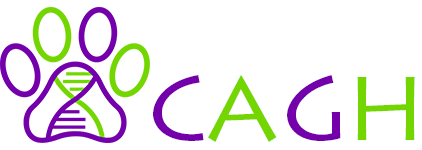Authors Nadine BOTHEREL (1,2)*, Laëtitia LAGOUTTE (1,2)*, Benoit HEDAN (1,2), Gilles CHAUDIEU (3), Florent ROLLIN (1,2), Patrick DEVAUCHELLE (4), Clotilde de BRITO (1,2), Philippe PILORGE (5), Anne-Sophie GUILLORY (1,2), Stéphanie ROBIN (1,2), Jérome ABADIE (6), Laurent TIRET (7), Rachel LAVOUE (8), Marie ABITBOL (9), Anne THOMAS (10) and Catherine ANDRÉ (1,2)
Affiliations (1) CNRS, UMR6290, Institut de Génétique et Développement de Rennes, Rennes, France. (2) Université de Rennes 1, UEB, Biosit, Faculté de Médecine, Rennes, France. (3) Clinique vétérinaire Beaulieu, Chamalières, France (4) MICEN-Vet, Créteil, France (5) Clinique vétérinaire St Cyr, Rennes, France (6) Ecole Nationale Vétérinaire de Nantes, ONIRIS, Nantes, France (7) Ecole Nationale Vétérinaire d’Alfort, ENVA, Maisons-Alfort, France (8) Ecole Nationale Vétérinaire de Toulouse, ENVT, Toulouse, France (9) Ecole Nationale Vétérinaire de Lyon, VetAgroSup, Marcy l’Etoile, France (10) Antagene, Laboratoire de Génétique Animale, La Tour de Salvagny, France. (11) AFVAC: Association Française des Vétérinaires pour Animaux de Compagnie, Paris, France
Presentation Type Poster
Abstract
Dog represents a spontaneous model of many genetic diseases including cancers and other multifactorial diseases as well as monogenic diseases. The last 10 years, genetic tools dedicated to dogs allowed to identify the genetic causes or predisposition to canine and human homologous genetic conditions. More recently, the idea emerged that dogs can be of help for therapeutic trials, to screen and validate new drugs in homologous human cancer types. To this aim, we created the canine Cani-DNA biobank in 2003 to collect blood and tissue samples from dogs affected with genetic diseases and healthy dogs. Cani-DNA contains the native samples and extracted nucleic acids as well as clinical and genealogical data, to distribute samples with high quality controlled procedures. This resource is implemented by a French veterinarian network based on vet practices, specialized vet centres and histopathology laboratories. In 2012, a contract signed between Cani-DNA and the 4 French vet schools and the Antagene Company allowed a national organization and international visibility. Cani-DNA joined the French consortium of domesticated animals, CRB-Anim (funded by French government 2012-2020), aiming to combine genetic and reproductive resources.
To date, Cani-DNA, with its primary site at CNRS Rennes and secondary sites at the fourth Vet Schools and Antagene contains almost 20 000 DNA extracted from blood and 3000 nucleic acids (DNA, RNA) extracted from tissue samples (tumoral and controls), representing 300 breeds and over 100 genetic diseases. Samples can be sent to implement Cani-DNA and can be distributed for research purposes, upon e-mail ordering (cani-dna@univ-rennes1.fr) or through : http://dog-genetics.genouest.org. We plan to facilitate exchanges and access to such samples for biomedical research with other European biobanks such as those in Bern with 40 000 samples from ~100 breeds (T. Leeb) and Helsinki with 60 000 samples from 330 breeds. (H. Lohi).
